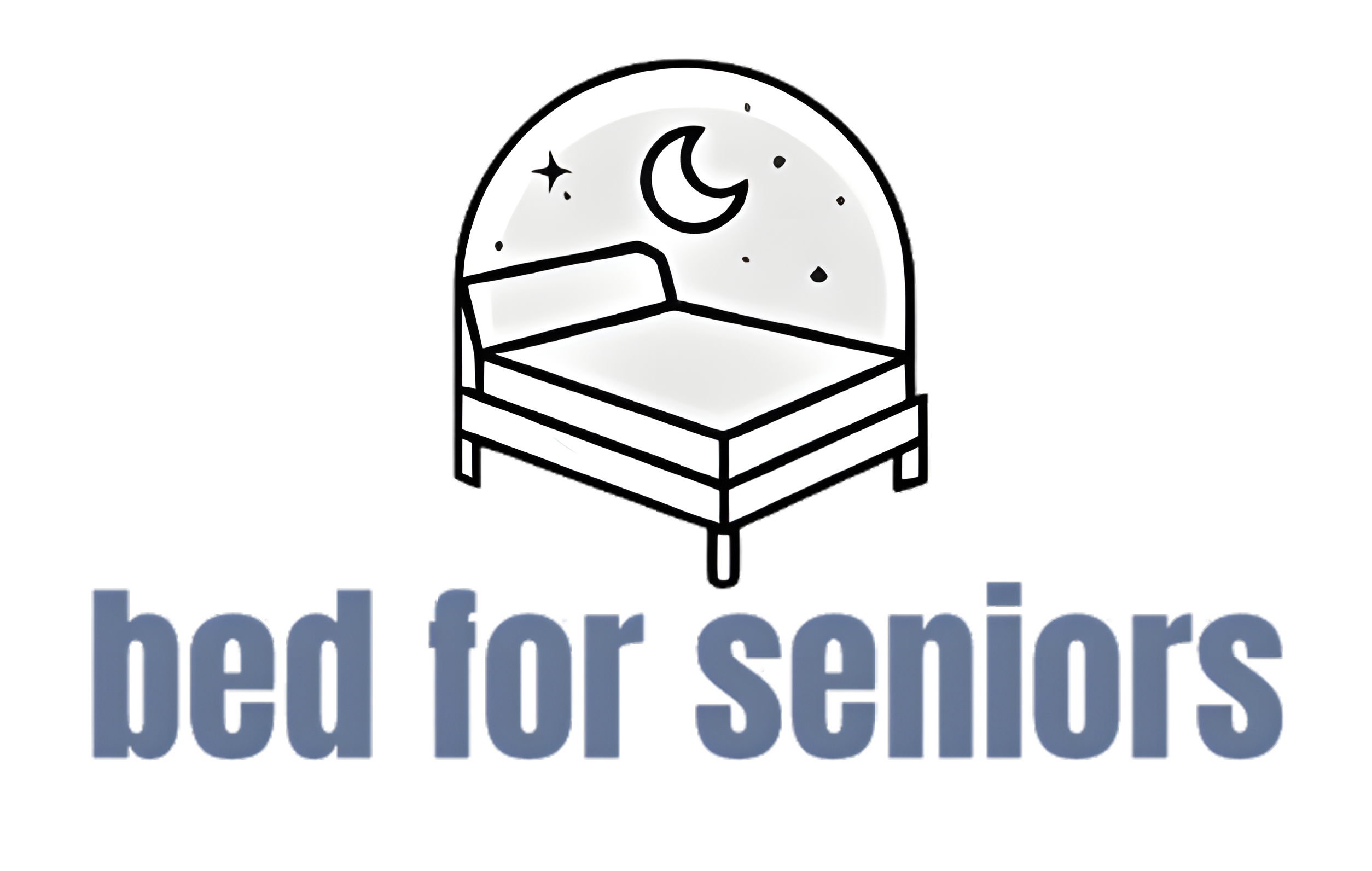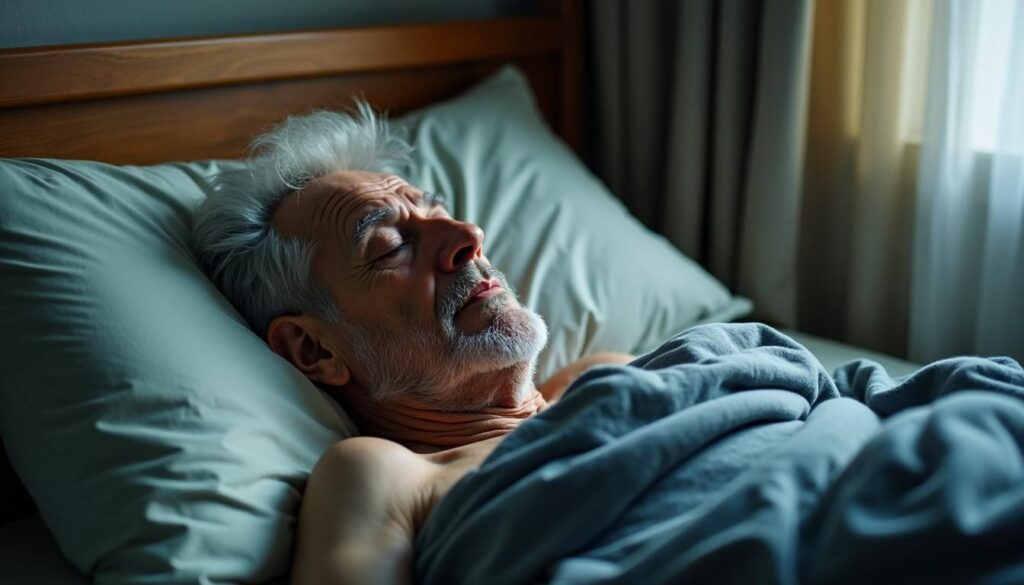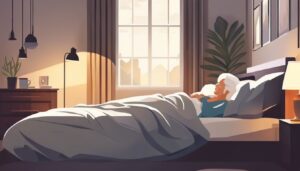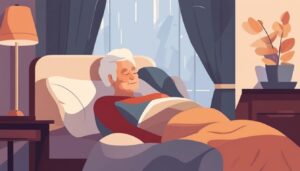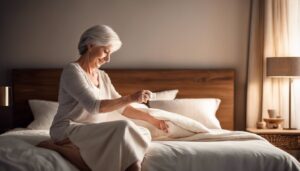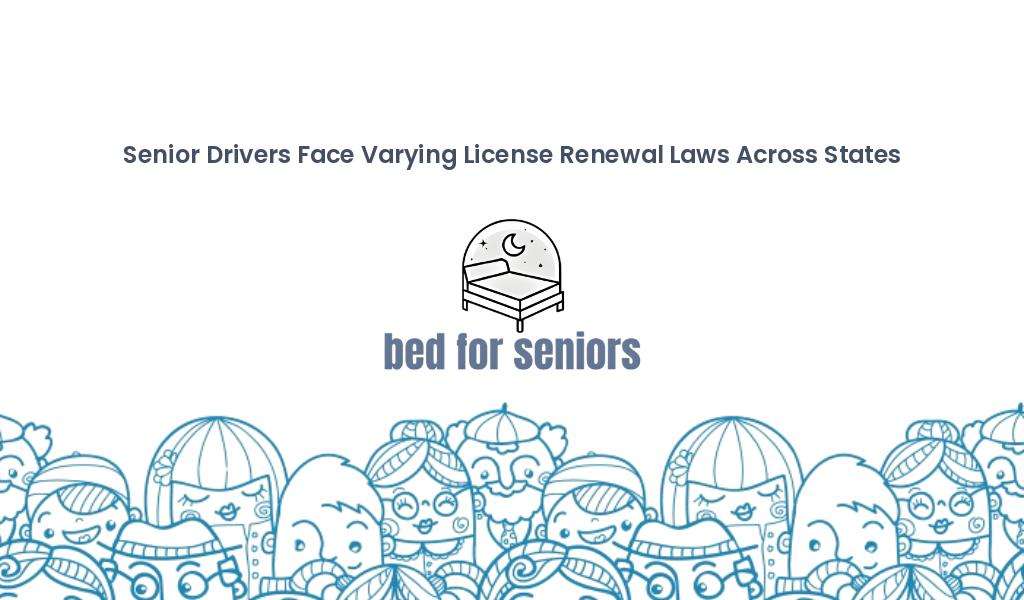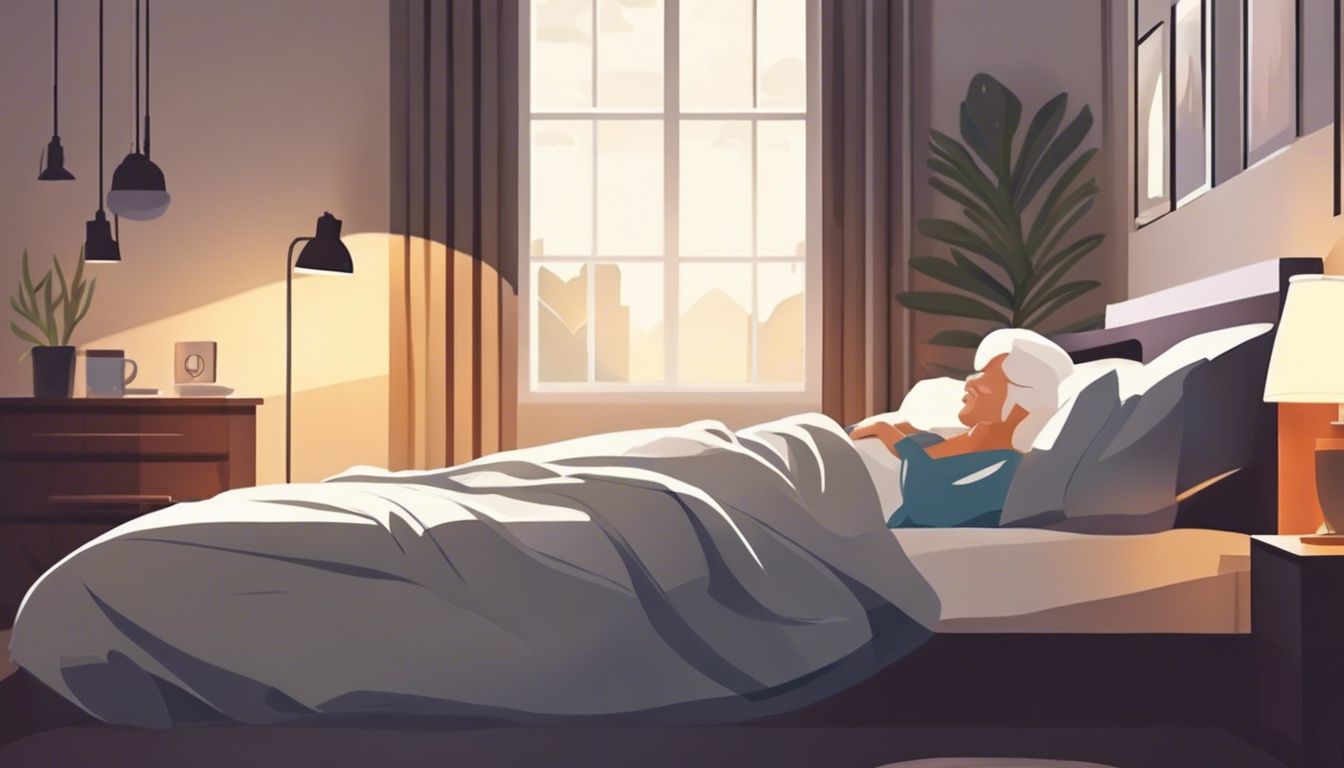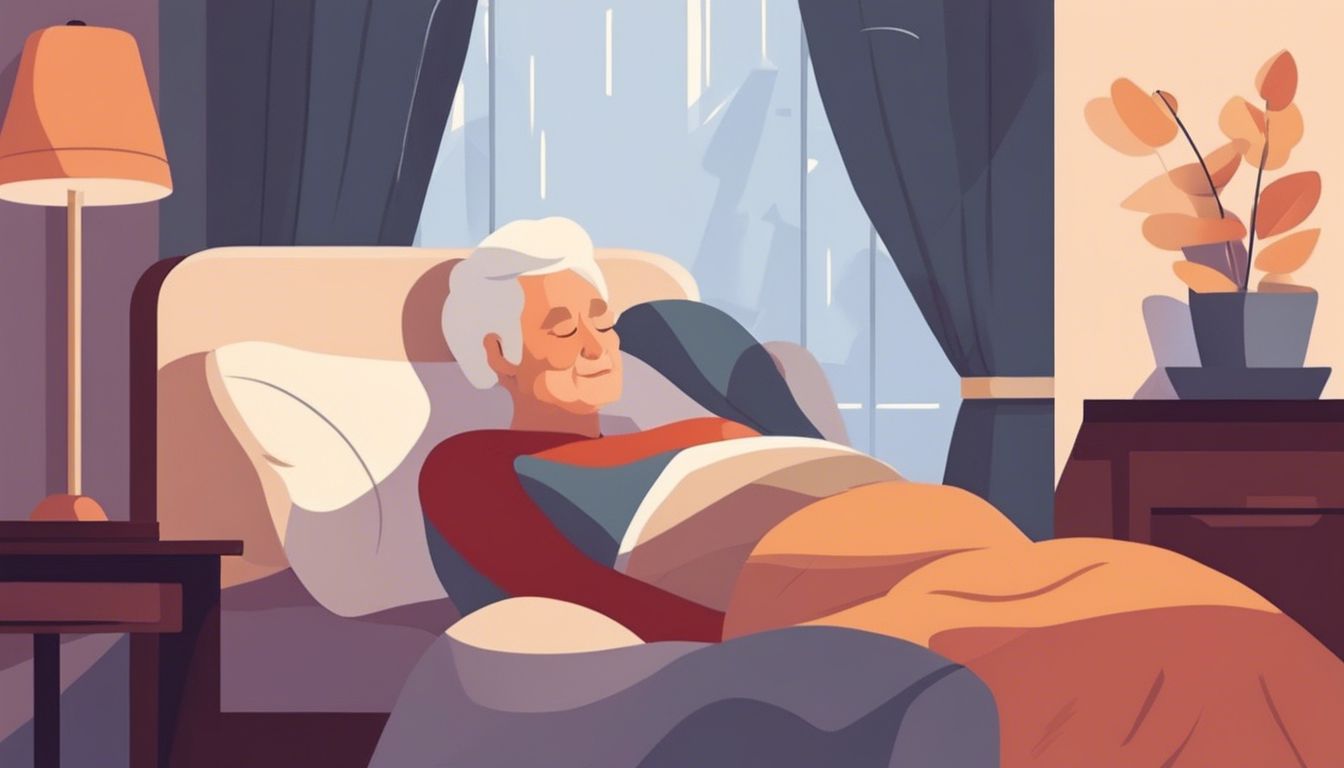Many people find their sleep changes as they get older. Aging impacts how long we sleep and the quality of our sleep. This article will explain what shifts in your sleep are normal with age.
Keep reading to learn more.
📋✅
- Aging makes it harder to fall asleep and stay asleep. Older adults sleep fewer hours, wake up more at night, and have less deep sleep.
- Napping during the day is more common for older people. This can affect their nighttime sleep.
- Good habits like keeping a regular sleep schedule and making the bedroom comfortable can help improve sleep for seniors.
- Changes in hormones like melatonin also play a role in changing sleep patterns with age.
- If older adults have trouble sleeping often, talking to a doctor can help figure out if there’s a bigger problem.
Overview of Age-Related Changes in Sleep Patterns
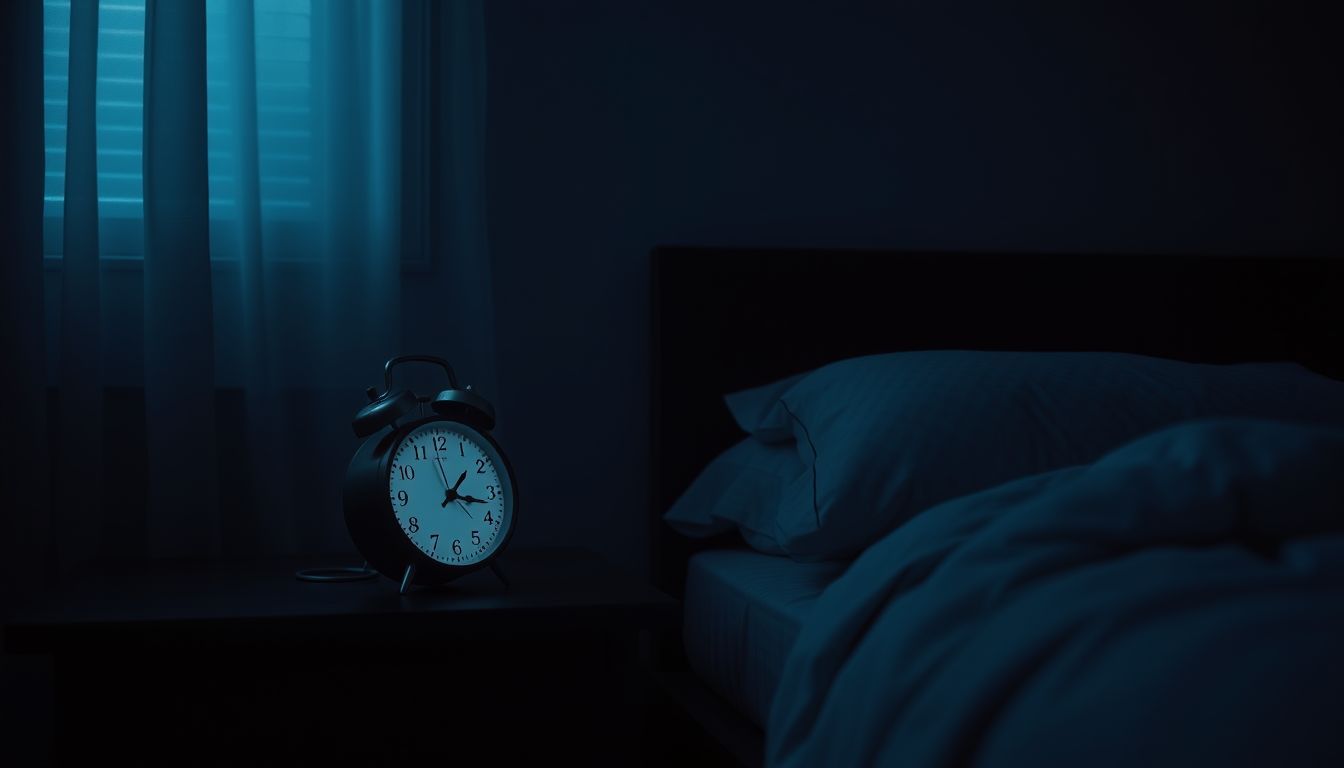
As we get older, our sleep changes. It might take longer to fall asleep, and staying asleep can be harder.
Sleep duration
Sleep duration changes as people get older. Research shows that total sleep time drops by about 8 to 10 minutes each decade. This means young adults might sleep for around 10.5 hours, but this decreases to 9.1 hours in middle age and further down to only about 8.1 hours for older people.
These numbers highlight a clear trend: as we age, we spend less time asleep.
Older folks often find they can’t stay asleep as long as they used to. They wake up earlier and have a hard time falling back asleep if they wake up in the night. The National Sleep Foundation reports these are normal parts of aging, not signs of a sleep disorder or other health issues.
As you grow older, expect your sleep patterns to change along with everything else.
Sleep initiation
After talking about sleep duration, we see that falling asleep, or sleep initiation, doesn’t get much harder after age 60. Most older adults can start sleeping within the same time frame as younger people.
This fact might surprise some caregivers who think their older loved ones take longer to fall asleep. Truth is, problems with starting to sleep may not be due to aging itself but could be linked to other things like stress or health issues.
To ensure smooth transition into sleep for seniors, keeping a stable bedtime routine helps a lot. Avoiding caffeine late in the day and creating a restful environment can also make a big difference.
Just like turning off bright lights and reducing loud noises before bed aids in signaling the body it’s time for rest. These steps help maintain good “sleep hygiene,” making it easier for elderly individuals to begin sleeping once they lie down.
Sleep efficiency
Sleep efficiency shows how well you sleep. It gets less by about 10 minutes every ten years from age 30 to 60. This means, as people get older, they spend less time in deep sleep and more time awake at night.
Older adults might find themselves waking up often during the night. Despite these changes, sleep efficiency tends to not get worse after turning 60.
Next, we will look into how aging affects the ability to stay asleep throughout the night.
Sleep maintenance
Older adults often wake up more at night. They stay awake longer during these times. This change makes keeping a good night’s sleep hard. A quiet room and comfy bed help older people sleep better.
Good sleep habits matter at any age.
Next, we look at specific changes in REM and deep sleep stages due to aging.
Specific Sleep Stage Alterations with Aging
As we age, the makeup of our sleep shifts—expect less deep rest and changes in dream phases. Keep reading to learn how these shifts impact overall health and ways to manage them for better night’s rest.
Changes in REM sleep
REM sleep lessens by 0.6% per decade from the age of 19 to 75. This sleep phase plays a vital role in dreaming and the well-being of the brain. Aging adults experience less REM sleep, possibly impacting their cognitive function and memory retention.
Now, we’ll proceed to discuss the reduction in deep sleep stages.
Reduction in deep sleep stages
Moving from changes in REM sleep, older adults see a drop in deep sleep stages. This means they spend less time in slow-wave sleep (SWS), the part of rest that helps refresh the brain.
For women, SWS levels stay about the same as they age. But men lose 1.7% of their deep sleep every ten years.
As we age, our nights are less cradled by the deep peace of slow-wave sleep.
This decrease leads to more wake-ups at night and can make people feel tired during the day. It’s a big reason why many seniors find their sleep isn’t as restoring as it used to be.
Daytime Changes
Older adults often find themselves napping more during the day and feeling tired. This shift can make nights harder to rest through. Get ready to learn how this change impacts daily life and ways to manage it for better sleep at night.
Increased frequency of daytime naps
Older adults nap more often than younger people. In fact, 27.4% of them take daytime naps compared to only 11.9% of young adults and 14.4% of middle-aged adults. These short rests can help make up for nighttime sleep problems like insomnia or sleep apnea.
Napping during the day has become a common part of their daily routine. It’s not just about feeling sleepy; it’s a way to deal with less nighttime sleep and issues like restless legs syndrome or sleep disturbances that disturb their slumber at night.
Daytime sleepiness
Up to 20% of older adults face daytime sleepiness. This makes them want to nap more during the day. Sleep issues, such as fragmented night sleep and disturbances in their internal clock, cause this tiredness.
The body’s clock controls when we feel awake or sleepy by responding to light changes. As people age, this clock doesn’t work as well. So, they might wake up early or feel tired earlier in the evening.
Circadian rhythm adjustments also play a role here. Older adults have a phase advance, meaning their sleep-wake cycle shifts earlier. This can make staying asleep at night hard and increase daytime napping needs.
Next, let’s look into how circadian rhythm adjustments affect sleep in seniors.
Understanding Circadian Rhythm Adjustments
As we age, our internal clocks shift, leading to earlier bedtimes and wake times. This change can make it harder to adjust to jet lag or shifts in sleep schedules. To explore more on how these rhythms affect us, keep reading.
Phase advance
Phase advance means going to bed and waking up earlier than before. This happens as people get older. Their biological clocks change, making them sleep and wake up early. For example, a senior might start to feel sleepy at 7 PM instead of 10 PM.
Next, we will talk about how the strength of circadian rhythms changes with age.
Reduced amplitude in circadian rhythms
Older adults often see a drop in the strength of their body’s internal clock, known as circadian rhythms. This means the daily cycles that tell us when to sleep or wake up are not as clear as before.
For seniors, this change can make it harder to fall asleep at night and stay awake during the day.
The body relies on certain signals like light and darkness to set these rhythms. As people age, their eyes may not catch light as well, affecting how well this internal clock works.
Keeping a regular schedule helps strengthen these rhythms. Making sure rooms have plenty of natural daylight can also support better sleep-wake cycles for older adults.
Decreased ability adjusting to phase-shifting
As people age, they find it harder to adjust their sleep-wake cycle. This is due to changes in their circadian system. They may struggle with travel across time zones or adjusting to new daily schedules.
The timing of sleep shifts earlier, but older adults still face trouble sleeping at the right times.
This can lead to more naps during the day and feeling tired early in the evening. Next, we’ll look at how aging affects hormones related to sleep.
Sleep-Related Hormonal Changes Due to Aging
As we age, our bodies make less growth hormone and melatonin. This can change how well we sleep.
Decreased levels of growth hormone
Growth hormone drops as people get older. This hormone helps kids grow. It also keeps muscles and bones strong in adults. Less growth hormone means older adults may lose muscle and bone strength.
They might also have more fat.
Sleep quality can suffer without enough growth hormone. Deep sleep stages become shorter. Getting to sleep can take longer for seniors.
Less growth hormone affects both sleep and physical health.
Variations in cortisol levels
Cortisol levels change as people get older. The changes show less difference between day and night levels. This means at night, cortisol doesn’t drop as much as it should. For older adults, this can mess with sleep.
Doctors see more nighttime cortisol in seniors. This may lead to waking up often and not sleeping well. Knowing this helps us understand why good sleep can be hard for the elderly.
It also points to ways we might help them rest better.
Alterations in melatonin production
Just like cortisol levels change, so does melatonin in older people. Melatonin helps control sleep cycles. In older adults, less melatonin means it’s harder to fall asleep and stay asleep.
It gets lower with age.
This drop in melatonin can lead to fragmented sleep and more wake-ups during the night. Older people might find themselves waking up early and not being able to go back to sleep. This is a big reason for their sleep issues.
Common Sleep Disorders in Older Adults
Sleep issues often hit older adults hard. Insomnia, sleep apnea, and restless legs syndrome top the list—each bringing its own set of challenges.
Insomnia
Insomnia is a common sleep disorder in older adults. About 50% face trouble falling or staying asleep. This problem makes them tired during the day. They may find it hard to go to sleep, wake up too early, or not feel rested after sleeping.
Doctors link insomnia to medical conditions like heart disease and diabetes. Stress, pain, and medication impacts also play roles. For help, some turn to sleep medicine or see a specialist.
Changing habits can improve sleep too.
Sleep apnea
Moving from insomnia, another common sleep issue among older adults is sleep apnea. This condition causes pauses in breathing during sleep. It leads to snoring and sudden awakenings.
Sleep-disordered breathing, like obstructive sleep apnea, affects many seniors. They stop breathing for short times at night without knowing it.
Doctors use devices like positive airway pressure machines or oral appliances to help. These tools keep the airway open during sleep. Knowing signs of sleep apnea can lead to early treatment and better rest for seniors.
Restless Legs Syndrome
Restless Legs Syndrome, or RLS, makes legs feel uneasy. People need to move them to feel better. It often happens at night when they try to sleep. Seniors face this more than younger people.
RLS can lead to less sleep and feeling tired the next day. It’s part of periodic limb movement disorder in sleep. Doctors suggest lifestyle changes and sometimes medicine for it.
External Factors Affecting Sleep in the Elderly
Health issues, pills, and life changes can all mess with sleep for older people. Want to learn more? Keep reading.
Medical and psychiatric conditions
Older adults often face medical conditions like heart disease, lung problems, and diabetes. These health issues can make sleep harder. For example, pain from arthritis keeps many awake at night.
Lung diseases might cause trouble breathing, leading to poor sleep.
Anxiety and depression are psychiatric problems that also affect sleep. They can lead to insomnia symptoms—like having a hard time falling asleep or staying asleep. Managing these conditions is key for better rest.
Medication impacts
After discussing medical and psychiatric conditions, it’s time to look at how medications affect sleep. Nearly all seniors over 65 use prescription drugs. Many take more than five daily.
These medicines can change their sleep patterns. For example, some drugs make it hard to fall asleep or stay asleep through the night. Others might cause drowsiness during the day.
Medications for high blood pressure or depression are common culprits. They can mess with sleep stages like REM and deep sleep. This makes getting restful sleep harder for older adults.
Sleep specialists often review all medications that a senior is taking to spot any that could be causing sleep issues.
Environmental and lifestyle factors
Loud noises, bright lights, and an uncomfortable bed can make it hard for older adults to sleep well. These are part of the environment that affects sleep. For example, noise from traffic or a loud TV in the next room can keep someone awake.
Bright screens before bedtime also make sleeping difficult. Having a calm, dark place to sleep helps a lot.
Some lifestyle choices impact sleep too. Drinking coffee late in the day or not getting enough exercise can lead to trouble falling asleep. On the other hand, light physical activity like walking improves sleep quality.
It’s clear that what surrounds us and how we live our days have big effects on night-time rest.
Coping with Sleep Changes as You Age
Facing sleep changes as we get older? It’s normal. Simple steps like improving your bedtime habits and setting up a comfy place to rest can make a big difference.
Sleep hygiene practices
Sleep hygiene matters a lot for older adults. Up to 60% report poor sleep, yet good habits can help.
- Keep a regular sleep schedule. Go to bed and wake up at the same time every day.
- Make the bedroom sleep-friendly. Use dark curtains, quiet sounds, and comfy bedding.
- Limit naps to early afternoon and keep them under 30 minutes.
- Avoid caffeine and heavy meals before bedtime.
- Exercise daily, but not right before sleep.
- Get plenty of natural light during the day to help keep your inner clock set.
- Use the bed only for sleep. This helps your brain link bed with sleep time.
- Wind down for at least 30 minutes before lights out with a book or other calm activity.
- If you can’t fall asleep in 20 minutes, get up and do something relaxing until you feel sleepy.
- Check medicines with your doctor to see if they affect sleep.
- Manage stress through meditation or deep breathing exercises.
These steps address many factors from light exposure affecting the suprachiasmatic nucleus—an area of the brain that controls your circadian rhythm—to activities that stimulate rapid eye movement (REM) sleep or slow wave sleep crucial for restorative rest. Following these practices ensures your body gets enough rest to repair and rejuvenate itself, critical at any age but especially in older adulthood dealing with changing sleep patterns due to hormonal adjustments or chronic medical conditions influencing stages of sleep like REM or non-REM periods.
Creating an optimal sleep environment
Creating an optimal sleep environment is key for older adults facing changes in their sleep patterns. This helps tackle issues like increased nocturnal awakenings and reduced deep sleep efficiency.
- Keep the room dark to enhance melatonin production. Use blackout curtains or eye masks.
- Ensure the bedroom is quiet. Consider white noise machines to drown out disruptive sounds.
- Maintain a cool temperature between 60-67 degrees Fahrenheit to support deep sleep stages.
- Invest in a comfortable mattress and pillows that support good sleep posture.
- Limit screen time before bed due to blue light’s impact on circadian rhythms.
- Encourage a consistent sleep-wake schedule to stabilize the sleep-wake cycle.
- Address medical conditions, such as depression and anxiety, that disrupt sleep.
- Optimize light exposure during the day; sunlight regulates the suprachiasmatic nucleus (SCN), improving circadian rhythm function.
- Avoid caffeine and heavy meals close to bedtime; these can hinder sleep initiation.
- Create a pre-sleep routine involving relaxation techniques like reading or taking a warm bath.
Ensuring these steps are followed carefully will make a significant impact on improving nighttime restfulness for aging individuals, leading to better overall health outcomes.
When to seek medical advice
Caregivers should get medical advice if older adults have trouble sleeping often. This is key when they feel sad or worried a lot too. Up to 60% of older folks might need help for sleep problems.
Seeing a doctor is smart if they’re very tired during the day or have trouble thinking clearly — this could point to heart issues or brain health concerns. Also, signs like waking up a lot at night and not being able to go back to sleep could mean something more serious.
Doctors can check if conditions like insomnia, sleep apnea, or restless legs syndrome are causing the problem. They might also look for changes in how much growth hormone or melatonin the body makes.
Fixing other health troubles often helps people sleep better. So, it’s good to talk with a healthcare provider about these issues early on.
Non-Pharmaceutical Approaches to Improving Sleep Quality for Seniors
Good sleep is key for seniors to stay healthy. Many can improve sleep without medicines. Here’s how:
- Stick to a schedule – Go to bed and wake up at the same time every day, even on weekends.
- Create a bedtime routine – Do calming activities before bed, like reading or listening to soft music.
- Make the bedroom comfortable for sleep – Keep it dark, cool, and quiet.
- Limit naps – Short naps early in the afternoon are okay but avoid long or late-day naps.
- Exercise regularly – Light activities like walking can help improve sleep quality.
- Watch what you eat and drink – Avoid big meals, caffeine, and alcohol close to bedtime.
- Get sunlight in the morning – It helps keep your body’s clock on track.
- Manage stress – Try techniques like deep breathing or meditation to relax before bed.
- Check medications with doctors – Some can affect sleep; ask if they can be taken at different times.
- Use the bed only for sleep and intimacy – This helps your brain link the bed with sleeping.
Following these steps can lead to better sleep for seniors without relying on sleep medicine.
Myths vs. Facts About Aging and Sleep
Old people don’t need as much sleep, and naps fix night-time sleep problems — these are myths. The truth? Sleep needs stay stable, but sleep patterns change with age. Ready to learn more?
Do older people need less sleep?
Older adults often think they need less sleep. This is not true. They still need 7 to 8 hours, just like younger adults. But, half of them say they don’t sleep well. Their bodies produce less melatonin, making it harder to fall asleep and stay asleep.
Sleep patterns change as people age. They might wake up early or take naps during the day. These changes can mess with their night-time sleep. It’s part of getting older but not a sign that they need less rest.
Can naps compensate for nighttime sleep issues?
Naps can’t fully make up for lost nighttime sleep. Still, they help when you didn’t sleep enough at night. In places like China and the Mediterranean, napping is common and helps people feel more alert during the day.
Short naps can boost mood and performance. Yet, relying only on naps might lead to problems falling asleep or staying asleep at night.
Next, let’s talk about how less deep sleep stages change as we get older.
Conclusion
Aging changes how we sleep. We might find it harder to fall asleep and stay that way through the night. Expect more waking up and less deep sleep. Your body clock shifts, making you sleepy earlier in the evening and wakeful before sunrise.
Daytime naps become more common too. These shifts are normal as we get older. Knowing them helps us adjust our routines for better rest at any age.
For more detailed strategies on enhancing nighttime rest without medication, check out our guide on non-pharmaceutical approaches to improving sleep quality for seniors.
FAQs
1. What changes in sleep patterns can we expect as we age?
As we age, our sleep architecture alters. This includes changes in REM and non-rapid eye movement sleep, increased light sleep, longer sleep latency periods, and decreased total sleep time (TST).
2. Can health conditions affect my sleeping pattern as I get older?
Absolutely! Conditions like Alzheimer’s disease, Restless Legs Syndrome (RLS), Periodic Limb Movement Disorder (PLMD), Obstructive Sleep Apnea (OSA) and Central Sleep Apnea are known to disrupt normal sleeping patterns.
3. How do hormonal changes impact our bedtime routines during aging?
Reproductive hormones play a significant role in regulating our circadian clocks or natural body rhythms that dictate when we feel tired or awake. Postmenopause women often experience hot flashes which can lead to difficulty sleeping.
4. Are there any lifestyle factors that contribute to poor quality of sleep as one grows older?
Yes indeed! Social isolation and certain medications can cause insomnia symptoms such as restlessness and difficulty falling asleep at night.
5. Is there a link between aging-related disorders and abnormal nighttime behaviors?
Studies from the University of Washington suggest an association between Rapid Eye Movement Sleep Behavior Disorder with periodic limb movements in sleep – both common issues among elderly people leading to disrupted slumber.
